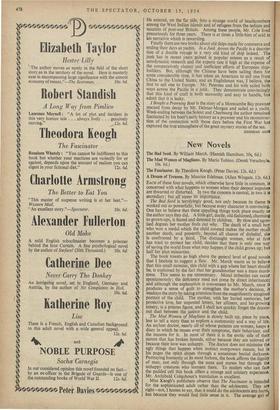New Novels
The Bad Seed. By William March. (Hamish Hamilton. 10s. 6d.) The Fascinator. By Theodora Keogh. (Peter Davies. 12s. 6d.) A Dream of Treason. By Maurice Edelman. (Allan Wingate. 12s. 6d.)
EACH of these four novels, which otherwise have little in common, is concerned with what happens to women when their deepest impulses are thwarted or disturbed. In two the concern is central, in two it is secondary; but all stress its importance.
The Bad Seed is terrifyingly good, not only because its theme is worked out so powerfully, but because every character is convincing. One has to believe that these appalling things took place exactly as the author says they did. A little girl, docile, old-fashioned, charming to grown-ups, is feared and detested by children. By slow and agon- ised degrees her mother finds out why. The death of a small boy who won a medal which the child coveted makes the mother recall another death, and presently, beyond all chance of disbelief, she is confronted by a third. The distraught woman, who at first has tried to protect her child, decides that there is only one way of saving the world from what may happen if the child grows up; but half her plan miscarries.
The book towers so high above the general level of good novels that I hesitate to suggest a flaw. Mr. March wants us to believe that this small monster, this child with a gap where her heart should be, is explained by the fact that her grandmother was a mass murd- eress. This seems to me unnecessary. Moral imbeciles can occur spontaneously; the deficiency need not come by direct inheritance; and although the explanation is convenient to Mr. March, since it produces a sense of guilt to strengthen the mother's decision, it weakens the story by taking attention from the magnificently imagined portrait of the child. The mother, with her buried memories,, her protective love, her unposted letters, her silliness, and her growing misery, is a piteous figure, and I shall not quickly forget the drawn- out duel between the janitor and the child.
The Mad Women of Magliano is slowly built up, piece by piece, less to tell a story than to explore a community and a way of life. An asylum doctor, nearly all of whose patients are women, keeps a diary in which he muses over their symptoms, their behaviour, and the reasons for it. In most of them it is the erotic side of their nature that has broken bounds, either because they are unloved of because their love was unhappy. The doctor does not minimise the ugly things that happen when instinct overpowers reason, but in his pages the spirit shines through a sometimes bestial darkness. Portraying humanity at its most forlorn, the book.affirms the dignity of man, not only through the nuns and nurses but through the unhappy creatures who torment them. To readers who can face the padded cell this book offers a strange and salutary experience. Mr. Archibald Colquhoun's translation is excellent. Miss Keogh's publishers observe that The Fascinator is intended for the sophisticated adult rather than the adolescent. They are right—not, I hasten to say, that it could do the adolescents any harm/ but because they would find little sense in it. The average girl 01
fifteen would see no reason why an attractive and outwardly fastid- ious woman, with a four-year-old daughter and a good-looking husband who adored her and made frequent love to show it, should offer herself to a repulsive-looking acromegalic maker of salacious figurines who sweated vigorously and neglected to wash. We battered elders, who know that if a woman's primitive depths are unstirred she may do strange things once she hears the jungle tom- toms, may accept Miss Keogh's thesis. Her writing is supple and sensitive, and her observation clear; but her story, the haverings of an idle and empty-headed young woman, has an obsessive quality, and some of us may question its importance. Mr. Eldelman has set down, quite brilliantly, a parable for our time. A Foreign Minister and his second in command entrust a subordinate with a mission of such secrecy that no record of the conversation is kept. For reasons of high policy, he is to hand over to a French journalist what appears to be a confidential paper. When the storm bursts, and an aeroplane crash removes the two who Planned it, no one will believe the subordinate's story; and he finds himself liable to be charged with treason. Below this nightmare eddy flows the uneasy current of his private life. Hampered in his career by a wife who drinks to cover up her unhappiness at the loss of their child, he turns to a girl of eighteen Who has been devoted to him for years. Her love, intensified by rumours of his plight, is blown to a flame by his kisses: but her father has his own way of protecting the daughter whose welfare is all he has to live for.
This is a most intelligent story, showing a strong sense of reality and a swift and able pen. It confirms most vividly the theme com- mon to all these novels: for, as its very first words show, the wife's unhappiness is the weakness which enables his superiors to get at the hero and make him their catspaw.
L. A. G. STRONG



































 Previous page
Previous page